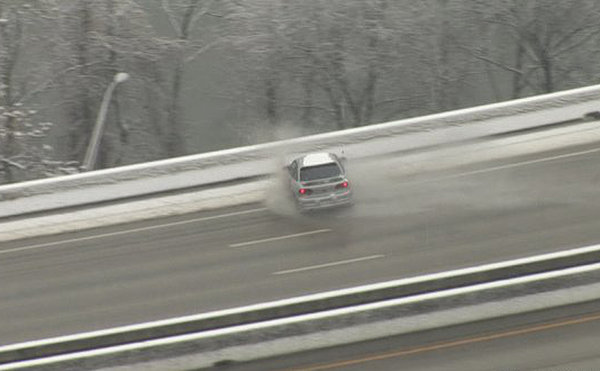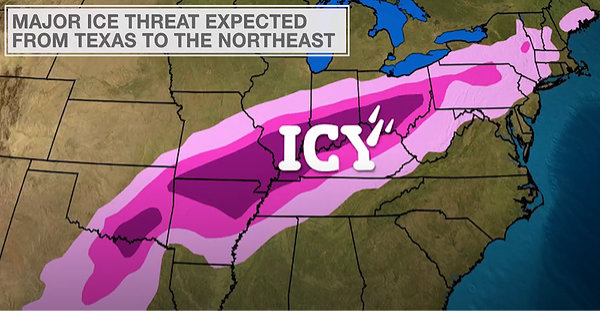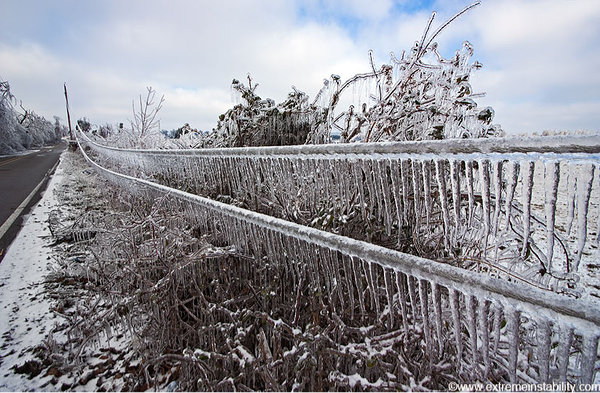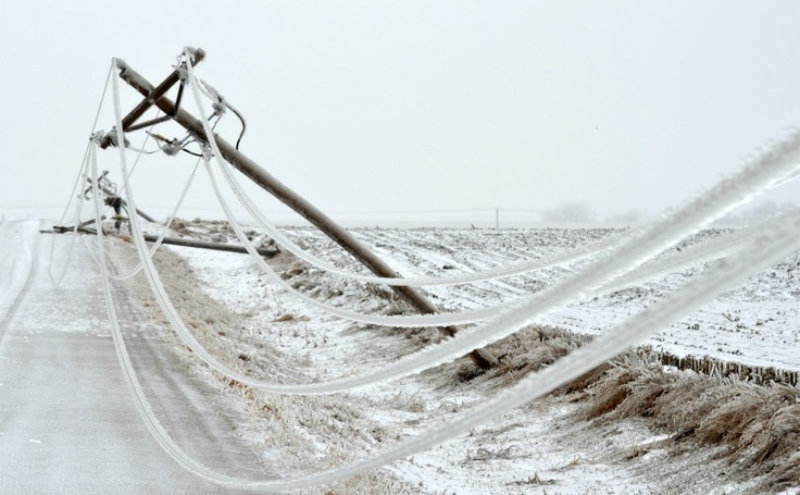Ice Storm Preparedness – Are You Ready?
Preparedness for an ice storm involves several unique considerations that are more serious than a winter snow storm.
A major ice storm event is forecast as I type this. It will affect a large geographical swath. There could be up to 1/2 inch of accumulating ice. That’s bad. Real bad! So, the forecast is a good excuse to write a post on ice storm preparedness.
I will talk about the unique and major problems with an ice storm event. And what you can do for preparedness.
Having experienced my share of ice storms over the years (of varying extents), expect two MAJOR likelihoods…
- Impossible travel
- Power outages
It’s simple, and obvious. When weather conditions are just right, freezing rain will rapidly build up on ALL SURFACES. It’s nearly impossible to drive a vehicle on thin “black ice”, let alone more than that! 1/8 inch. 1/4 inch. 3/8 inch. 1/2 inch! more?!!
Fuggedaboutit… You Won’t Be Driving During an Ice Storm

Be Home Before It Begins
You will not be traveling. At least, you better not be! So be sure to get home, or be home BEFORE the ice storm begins! You may not realize the importance of what I just said… The minute it starts glazing to ice, it’s TOO LATE. You’re going to wreck your vehicle and possibly injure yourself. Get home before it happens.
You WILL be risking your life if you drive on any roads during an ice storm. There will be a zillion accidents, spinouts, and people off the road. Good luck waiting for help…
Have you ever driven on ice? It’s nothing like snow! Turn the wheel and your vehicle keeps going the direction it was going… Hit the brakes and your vehicle keeps going the same speed it was going! It is a scary feeling to say the least.
Ice Storm Preparedness – The Most Important Thing…

Given what I said above, regarding being home before the ice storm starts, rather than cutting it close, so to speak… The most important thing for ice storm preparedness is to know the specific forecast for your local region.
Know The Forecast Well Before The Ice Storm
Today’s supercomputer weather modeling is pretty darn good. There are a handful of models that are predominately used by meteorologists. The two best-known models are the National Weather Service’s Global Forecast System, or GFS, and the European Center for Medium-Range Weather Forecast, known as the ECMWF model. They are also known as the American and European models, respectively. Generally speaking, the European model has produced the most accurate global weather forecasts.
Know When The Ice Storm Is Forecast To Begin
With that said, they are complicated. Meteorologists use this information for analysis to compliment their own experiences and other tools. Then, they simplify it for public consumption. The weather forecast. The timing of when the ice storm might begin. This is important.
Why do I mention the obvious? Well, every, single, time, there are countless people out on the roads during an ice storm. The News loves to highlight the wreckage and carnage of the idiots out in the storm, right? Don’t let that be you, is all I’m saying. It’s different from a snow storm, whereby it’s not terribly difficult to drive in (up to a point), especially with a properly equipped vehicle (e.g. 4WD, traction tires) – and experience driving in the snow. However, ICE? Not gonna do it… You’re gonna get stranded or wrecked.
Know WHEN it’s forecast to begin, and be home well before it. Leave work if you have to. Early.
SNAP… goes the Branches and Power Lines

Unique to ice storm preparedness are long term power outages.
Water is heavy. Ice is heavy. Picture a tree with all of it’s branches and limbs increasingly thick with ice. Eventually, SNAP… down comes the limbs. Down come the trees.
And do you know where they tend to fall? That’s right – on top of power lines.
Now picture this… power lines building up ice. Bit by bit. The weight of the building ice sagging the lines. Eventually, SNAP… down comes the power lines.
Now you’re at home with no power. And it’s winter. It’s cold outside. The likelihood of quick repair is slim to none. An ice storm event is wide spread. Crews cannot even begin to work until the roads are safer to travel. You’re going to be in the dark for a longer time that you might imagine… This can become quite serious during the winter.
No Power, No Heat, No Nuttin…
Your primary concerns at home. Heat. Maybe saving the food in your chest freezer. Those who are on well water…your pump will be out. Got enough food to last two weeks? More?
Again, your big concern will be heat. Plan ahead for this. A quick remedy is a portable heater. I own, and recommend the “Heater Buddy” as a simple and safe heater. I wrote about it in the following article.
[ Read: Buddy Heater Runtime ]
If you have a furnace (as opposed to electric heat), pre-preemptively hard wire its power source through a transfer switch. This will enable an outside generator to power the furnace. I’ve done this, except it’s by way of my solar system battery bank and inverter.
Of course, a portable generator operating outside. Extension cord run into the house. Here’s an article about the right extension cords for this…
[ Read: Best Extension Cord For Generator | Heavy Duty Gauge Recommendation ]
Those with electric heat (typical in the south because it’s not needed all that often). A typical sized generator will not be adequate to fully operate most electric heat systems. They draw A LOT of electricity/power. So a portable heater is probably a better option for you.
Okay, next… Maybe you’ve got a lot of cha-ching $$ invested in food setting in your chest freezer. Don’t open it. You’ll be good for 24-48 hours. Cover it with blankets. If you have a generator, you could run an extension cord to it. Operate it for an hour, a few times a day.
[ Read: Chest Freezer or Fridge During Power Outage ]
A few additional helpful things for Ice Storm Preparedness
Ice Cleats!
Oh my goodness I can’t tell you how often my ice cleats have saved the day…and probable falling on my butt. Just get a pair. They are well worth it! Here’s an article that I wrote about my ice cleats…
[ Read: Best Ice Cleats for Shoes & Boots – Winter Walking & Hiking Traction ]
TIP: If you have stairs leading to your front door, or porch, etc.., it may look clear, but thin ice is impossible to see (usually). Don’t break a hip by assuming those stairs aren’t slippery! Ice cleats. Hold on to the rail.
Battery Powered Radio
Information! I advocate having a portable battery operated radio. One that gets AM/FM which is where you will find your local news and information. Some broadcast stations will still be up and running because the big guys have big generators to keep on transmitting.
[ Read: Best AM Radio for Long Range Listening ]
[ Read: Best Cheap AM/FM Portable Radio ]
Additional obvious items include flashlights, headlamps, extra batteries thereof, cooking stove safe for indoors, warm blankets, and… patience.
[ Read: Cooking Stove Safer For Indoors ]
[ Read: Headlamp or Flashlight | Compared | Which is Best? ]
Preparing for a Winter Snowstorm – Basic Supplies for Power Outage
The most important thing to do before an ice storm is to get home first.
Pre-preemptively have a solution for supplemental heat, because the power will likely go out, and it’s winter time. Safety first. Got well water without a generator backup? You better secure a storage of water. Then, food. Then the creature comforts.
Apart from that, enjoy the beauty of the ice storm. It is a remarkable scene. Especially when the sun comes out after it’s over. Take some pictures. Hopefully it won’t be a regular thing!
[ Read: How to Charge Your Phone When the Power is Out ]
[ Read: Warmest Blanket Material For Winter — Fleece vs Wool ]

